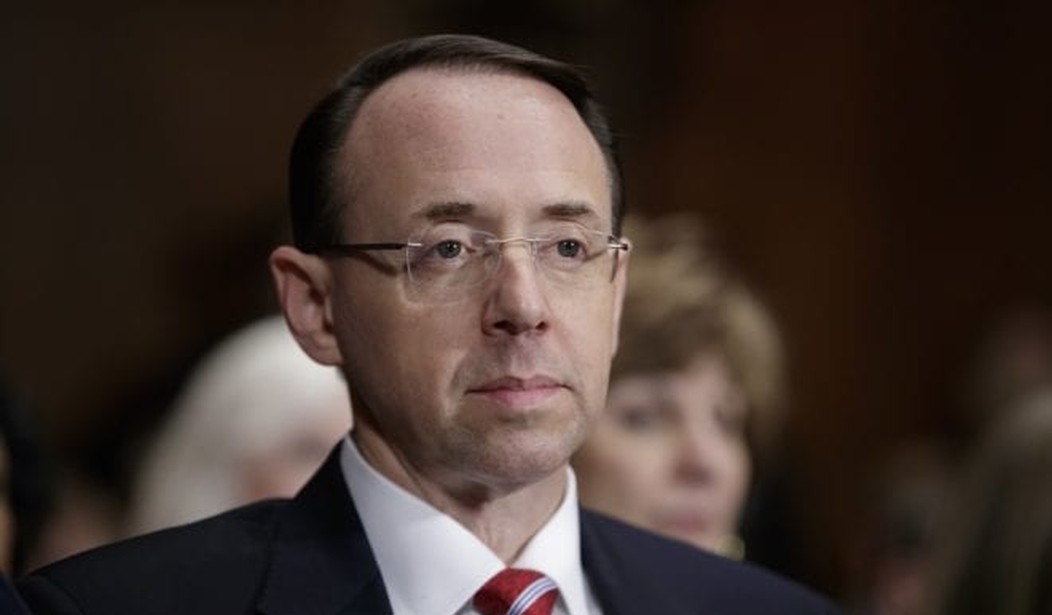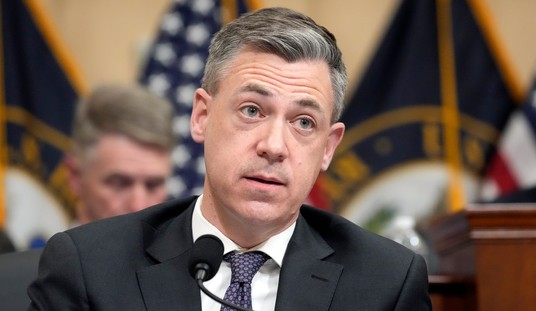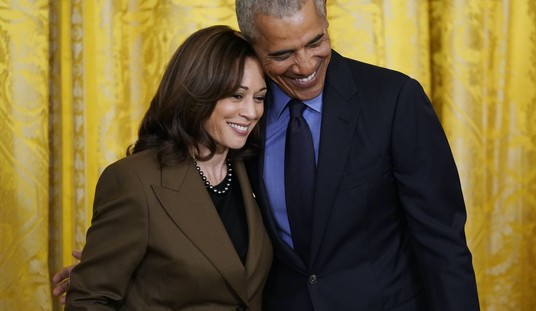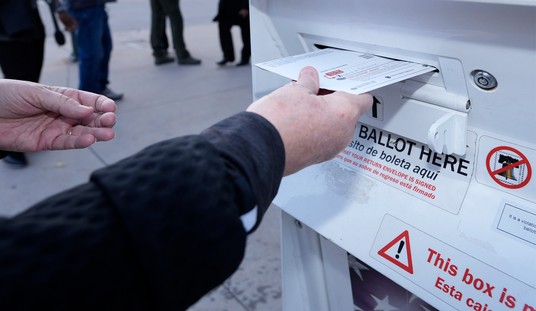
Deputy Attorney General-designate, federal prosecutor Rod Rosenstein, listens on Capitol Hill in Washington, Tuesday, March 7, 2017, during his confirmation hearing before the Senate Judiciary Committee. (AP Photo/J. Scott Applewhite)
Watchdog group Judicial Watch released 145 pages of former Deputy Attorney General Rod Rosenstein’s communications on Thursday. No one will be surprised to learn that he was indeed a creature of the deep state.
Over a year ago, Judicial Watch filed a Freedom of Information Act (FOIA) request seeking, “Any and all e-mails, text messages, or other records of communication addressed to or received by Deputy Attorney General Rod Rosenstein between May 8, 2017, and May 22, 2017.”
Here is a timeline of events from that period:
May 8, 2017: Rosenstein wrote the memo in which he made the case for then-FBI Director James Comey to be fired.
May 9, 2017: President Trump fired Comey.
May 12, 2017: Rosenstein sent an email to then future Special Counsel Robert Mueller telling him, “The boss and his staff do not know about our discussions.” This email tells us all we need to know, and had long suspected, about their relationship.
May 16, 2017: Rosenstein emailed former Bush administration Deputy Attorney General and current Kirkland & Ellis Partner, Mark Filip writing, “I am with Mueller. He shares my views. Duty Calls. Sometimes the moment chooses us.”
May 17, 2017: Rosenstein appointed former FBI Director Robert Mueller to the Special Counsel.
During this time, Rosenstein was “in direct communication with reporters from 60 Minutes, The New York Times and The Washington Post. In an email exchange dated May 2017, Rosenstein communicated with New York Times reporter Rebecca Ruiz to provide background for this article about himself. Ruiz emailed Rosenstein a draft of the article, and he responded with off-the-record comments and clarifications.” Judicial Watch reports:
In an email exchange on May 17, 2017, the day of Mueller’s appointment, Rosenstein exchanged emails with 60 Minutes producer Katherine Davis in which he answered off-the-record questions about Mueller’s scope of authority and chain of command:
Rosenstein: “Off the record: This special counsel is a DOJ employee. His status is similar to a US Attorney.”
Davis: “Good call on Mueller. Although I obviously thought you’d be great at leading the investigation too.”
On May 17, 2017, in an email exchange with Washington Post journalist Sari Horwitz and the subject line “Special Counsel” Rosenstein and Horwitz exchanged:
Rosenstein: “At some point, I owe you a long story. But this is not the right time for me to talk to anybody.”
Horwitz: “Now, I see why you couldn’t talk today! Obviously, we’re writing a big story about this. Is there any chance I could talk to you on background about your decision?”
Judicial Watch President Tom Fitton said, “These astonishing emails further confirm the corruption behind Rosenstein’s appointment of Robert Mueller. The emails also show a shockingly cozy relationship between Mr. Rosenstein and anti-Trump media reporters.”
Last month, Judicial Watch obtained a copy of a two-page memo written by then acting FBI Director Andrew McCabe on May 16, 2017. This memo was McCabe’s “contemporaneous recollection” of the infamous meeting held in then-Deputy Attorney General Rod Rosenstein’s office during which Rosenstein had allegedly proposed wearing a wire to record the President. McCabe wrote:
As our conversation continued the DAG proposed that he could potentially wear a recording device into the Oval Office to collect additional evidence on the President’s true intentions. He said he thought this might be possible because he was not searched when he entered the White House. I told him that I would discuss the opportunity with my investigative team and get back to him.
In September 2018, The New York Times reported on this meeting. Their article said this group had allegedly discussed the possibility of invoking the 25th Amendment to remove Trump from office. In addition, Rosenstein said he knew of one or two members of Trump’s cabinet who might be on board with such a plan.
Rosenstein has publicly maintained that he was being sarcastic when he made this comment. But nothing in McCabe’s memo suggests this to be true. Rather, McCabe wrote he told Rosenstein that he would “discuss the opportunity with my investigative team and get back to him.”
I’ve never understood why Rod Rosenstein, who has played such a pivotal role in the investigation of President Trump has received so little scrutiny. The matter of whether or not he volunteered to wear a wire is only part of what he must answer for. He needs to be asked why he appointed a Special Counsel when the FBI had no evidence that Trump had colluded with Russia in May 2017. We know this for a fact because, during her Congressional testimony last summer, FBI attorney Lisa Page admitted it.
So, why did Rosenstein do it? He needs to be questioned under oath.
Why did he allow Mueller to expand the scope of the investigation? What, if any, evidence did Rosenstein require from Mueller to expand the scope? Was there ever a Mueller request that Rosenstein said no to?
It was Rosenstein’s role to supervise the activities of the Special Counsel, and his apparent submission to Mueller suggests that Mueller was actually driving the bus.
Think about this. For over two years, we’ve been learning information about the activities of the deep state and all of it has corroborated the theory that this group has deliberately sought to destroy first candidate Donald Trump and following his surprise victory, President Donald Trump. No contradictory evidence has been presented. As hard as they’ve tried to cover up their complicity, somehow, albeit painfully slowly, the truth has come out.













Join the conversation as a VIP Member